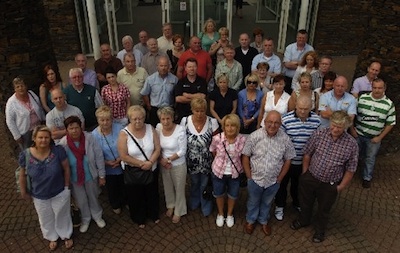
By Jim Gibney (for Irish News)
“Nothing before June 15 or after June 15 will surpass the sense of elation and breakthrough that I felt and that includes the soldier charged, a successful prosecution and imprisonment,” - Tony Doherty, whose father Paddy was shot dead on Bloody Sunday in Derry.
“I want the bastard screwed. He murdered my brother and two others. He walked around the Bogside shooting people. He showed total contempt. I do not apologise for my attitude. My brother was 17 years old. To this day Nazis are being prosecuted for their crimes during the Second World War.” -John Kelly, whose brother Michael was shot dead on Bloody Sunday. Both men were speaking earlier this month at Belfast’s Feile an Phobal.
It was the first time that many of the Bloody Sunday relatives had spoken publicly about their feelings since the publication of the Saville report on June 15. Mr Doherty was not sure whether they were right to speak about how they felt because the families had not met to discuss how to handle the situation after Saville’s findings were published. But long before Seville’s judgment and in the period since, Mr Doherty was settled in his mind that his personal crusade on his father’s and family’s behalf would end when those killed were exonerated as innocent civil rights marchers and the Widgery report into Bloody Sunday was repudiated.
All the relatives believe Saville’s report did precisely that. For Mr Kelly, Saville “was a job well done”.
Aware of the irony of his comments about the huge tragedy he said: “It was one of the greatest moments of my life. I was ecstatic.”
For him his battle for prosecution lies with his solicitor. His days of campaigning on the streets are over.
“If it happens it happens but I want it to happen,” he said.
“I will see soldier ‘F’ in court for murder, attempted murder, perjury and brutality.”
Soldier F killed Tony’s father, John’s brother and Bernard McGuigan.
Tony’s father was 31-years-old when he was shot dead. I remember Tony telling me how difficult was his own 31st birthday when he surpassed his father’s age.
At the Feile meeting he spoke about the “devastating gap” in his life growing up without his father, about realising “your daddy’s gone” and the impact it had on his mother and brothers and sisters.
John Kelly recalled that his brother was a ‘special child’ because he had miraculously survived an illness when he was three-years-old.
Michael had a special relationship with his mother. She refused to let him go on the Bloody Sunday march and when he did go she secretly followed him to keep an eye on him.
She was in a flat overlooking the spot where soldier ‘F’ fired the shot that killed her son. Mr Kelly said he not only lost his brother on Bloody Sunday he also lost his mother for a time because she was distraught with grief.
He recalled her at the wake lifting Michael bodily from the coffin and on a winter’s night she took a blanket to his grave “to keep him warm”.
Before going to Derry’s Guildhall to hear Saville’s judgment he visited his parents’ grave, “to speak with them”.
It was not easy for Mr Doherty to decide not to pursue soldier ‘F’. At one time he would have “throttled” the soldier but now “Saville’s report, the public acknowledgement and fulsome apology” (from David Cameron) has created a space for him to reflect on his future, “to move on at peace with myself and the rest of the world in the knowledge of having secured an immense achievement “
Going into the Guildhall on that memorable morning in June the families of the Bloody Sunday dead did not know what to expect.
However, they were buoyed up with a feeling that the people of Derry and Ireland were with them the very people who never let them down, while others in the Catholic establishment, political and clerical, did.
In the audience at the Feile meeting, listening attentively, were relatives with a shared experience of an ignored massacre, those killed in Belfast’s Ballymurphy in 1971.
“Don’t give up,” was the advice from Tony and John and an offer of help at any time.
![[Irish Republican News]](https://republican-news.org/graphics/title_gifs/rn.gif)
![[Irish Republican News]](https://republican-news.org/graphics/title_gifs/harp.gif)

